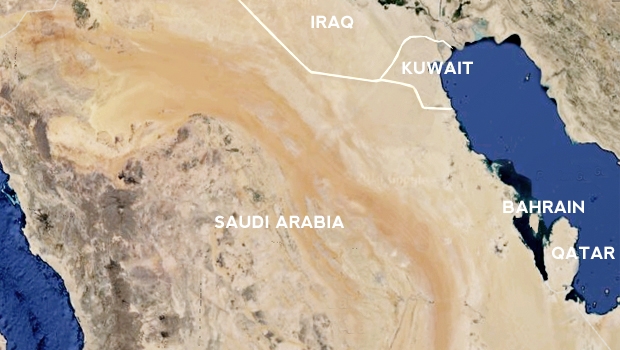Saudi ends 'largest' manoeuvre in its history

RIYADH - Saudi Arabia ended military excercises Tuesday along the borders of Iraq and Kuwait, as well as other regions, in what the media described as the largest in the kingdom's history.
"We are preparing our armed forces to protect" the nation, daily Al-Eqtisadiah website quoted general staff chief Lieutenant General Hussein al-Qabeel as saying.
The armed forces "do not aim to attack anyone as this is not our wise government's policy," Qabeel added.
English-language daily Arab News said "tens of thousands of soldiers, backed by military jets, helicopters and ships as well as tankers and anti-missile systems, are participating" in the "largest military exercise in the kingdom's history."
The operation, in which elite National Guard and interior ministry units also took part, was carried out in the eastern, southern, and northern regions, Al-Eqtisadiah website aleqt.com reported.
New MEE newsletter: Jerusalem Dispatch
Sign up to get the latest insights and analysis on Israel-Palestine, alongside Turkey Unpacked and other MEE newsletters
It "aims at increasing the level of training and testing the capability of our armed forces in deterring any attack from any of these sides," the daily quoted Qabeel as saying.
In 1990, Iraqi president Saddam Hussein's forces invaded and occupied Kuwait. They were expelled the following year in the Gulf War.
Some of the exercises took place in Hafr al-Batin, which borders Iraq.
Relations have been strained between predominantly Sunni Muslim Saudi Arabia and Saddam's successor, Prime Minister Nuri al-Maliki, whose Shiite-led government is backed by Tehran.
In March, Maliki charged that Saudi Arabia and neighbouring Qatar were supporting terrorism worldwide, which drew harsh criticism from the kingdom, Iran's rival across the Gulf.
In November, Iraqi pro-Iranian Shiite group Jaish al-Mukhtar claimed it had fired six mortar rounds into a remote area of northeastern Saudi Arabia as a "warning" to the kingdom.
Meanwhile, three Saudi soldiers were killed by gunmen who fired from across the border with Yemen to the south, which is frequently crossed by smugglers and by Islamists seeking to join Al-Qaeda militants in the impoverished nation.
In 2009, Saudi forces fought a war against Shiite Huthi rebels on the Yemeni border.
The rebels, accused by Sanaa of being backed by Iran, frequently clash with Yemeni troops as they try to extend their influence over more areas in the north and towards the capital.
Middle East Eye delivers independent and unrivalled coverage and analysis of the Middle East, North Africa and beyond. To learn more about republishing this content and the associated fees, please fill out this form. More about MEE can be found here.

